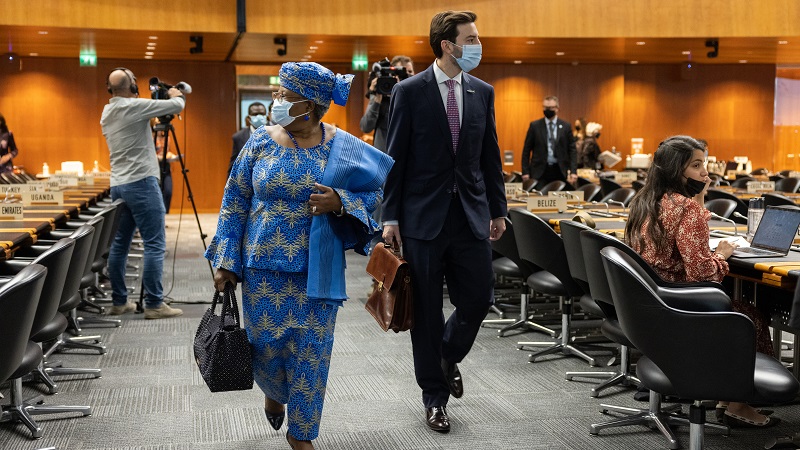After 20 years, global talks over reducing environmentally damaging fishing subsidies are entering their final stage at the World Trade Organisation (WTO).
On Thursday, 104 ministers and heads of delegation met virtually and gave a conditional blessing to the text of an agreement to remove harmful fishing subsidies.
This means delegations can now negotiate the nine-page draft text line by line for approval at the WTO ministerial conference in Kazakhstan, which starts on 30 November.
The talks aim to eliminate harmful subsidies such as for overfishing and for illegal, unreported and unregulated fishing.
WTO director-general Ngozi Okonjo-Iweala told a Geneva press conference: “For the first time in 20 years, we have a text which has been blessed by all the ministers and heads of delegations.”
While experts said this progress was encouraging for the climate, it remains open to what extent the rules will apply to China, the world’s biggest backer of unsustainable fishing practices.
Chileans look to new constitution to return water to communities
Rashid Sumaila, professor of fishery economics at the University of British Colombia, told Climate Home News: “I was gearing up for more bad news than I got. I’ve been following this for 20 years and they’ve come the furthest [now] because they have a text, so I’m reasonably happy.” But, he warned, it “doesn’t mean anything until we get it over the line” so “it’s all hands on deck”.
Sumaila said that the appointment of former Nigerian finance minister Okonjo-Iweala as Director-General had sped up negotiations as she “stuck her neck out” for the talks, placing fishing subisidies as her second priority behind Covid-19. He also praised the talks’ chair, Colombian ambassador Santiago Wills.
Fishing subsidies encourage overfishing, which is bad for fish stocks and for the climate. A 2018 study found fishing at the current scale is “enabled by large government subsidies”. Without them, as much as 54% of high seas fishing grounds would be unprofitable.
Fishing can harm the climate in several ways. Burning ship fuel releases greenhouse gases. Methods like bottom-trawling, where a big net is dragged along the sea bed, stir up buried carbon from the seabed. Fishing can damage seagrasses, which store carbon. Fish themselves store carbon on the seabed when they die naturally and fall to the bottom of the sea.
Developing nations put numbers on the table for the next climate finance goal
Global fishing subsidies were $35bn in 2018, of which harmful subsidies that increase the scale of the industry were $22bn, according to a study in the Marine Policy journal.
The same study found that China provides the most subsidies, with 21% of the total. EU states, the USA and South Korea are next with 11%, 10% and 9% respectively. The next biggest are Japan, Russia, Thailand, Canada, Indonesia, Norway and Taiwan.
Most subsidies provided by China are classified as harmful capacity-enhancing subsidies, for example making ship fuel cheaper. In the US, the study found subsidies were mostly spent on positive measures like fisheries management and stock enhancement.
While all of the draft text is still up for debate, square brackets indicate where divisions are expected. Contentious issues include to what extent poor and developing countries should be exempt and how developed countries should help developing ones implement the rules.
In the WTO, countries decide themselves whether they are developed or developing and China classifies itself as developing although the US says it is developed. China argues subsidies are a way of helping poor fishers but Sumaila said his research shows the subsidies go to large fleets.
Great to address the @WTO this morning on the UK’s strong stance against illegal and subsidised fisheries.
Good to make pragmatic proposals on how the SDT rules should benefit small, artisanal fishers from genuine developing countries – and not larger, ocean-going vessels. pic.twitter.com/VSrp6anjxm
— Greg Hands (@GregHands) July 15, 2021
A clause being considered would allow developing countries including China to continue to subsidise increased fishing capacity. The exceptions to this would be if that developing country does distant-water fishing, has an income of more than $5,000 per capita, produces more than 2% of the world’s fish and gets more than 10% of its income from fishing, farming and forestry. China would not meet the threshold as just 8% of its income is from fishing, farming and forestry.
Other contentious issues include what information should be made transparent, how to judge when a ship is carrying out illegal, unreported or unregulated fishing and whether countries should be able to subsidise ships registered with another countries’ flag.
Okonjo-Iweala said there was unanimous agreement among countries that small-scale fishers, particularly in developing countries, should be protected from the change in rules.
Among those most in favour of reducing fishing subsidies are the “friends of fish” group, which consists of the US, several South American nations, Australia, New Zealand, Pakistan, Norway and Iceland.
India was among those pushing for a slower phase-out of subsidies, according to Indian website LiveMint. Commerce minister Piyush Goyal said: “India is committed to concluding the negotiations, as long as it provides for balancing current and future fishing needs, preserving space for equitable growth in fishing capacities in future, and an effective [special and differential treatment] without any imbalances”.
